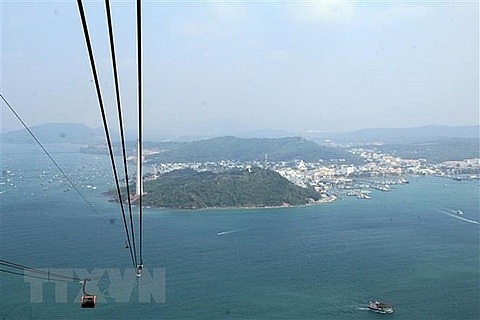 Economy
Economy


|
HCM CITY — The Ministry of Construction has green-lighted Kiên Giang Province’s proposal to suspend the master plan to develop Phú Quốc Island into a special administrative-economic zone (SEZ).
In a report to the Government Office, the ministry said: “Right now is not the right time to establish a master plan to develop Phú Quốc Island into an SEZ due to lack of provisions in the current laws on planning [to set up a special economic unit].”
But as a long-term development strategy, it said the province should draft a new master plan to develop Phú Quốc sustainably, ultimately making it an SEZ.
Kiên Giang authorities had sought permission from the Government to suspend the master plan until a draft SEZ law is approved by the National Assembly.
In a report to the Prime Minister, the province said it now wanted to develop the island into a normal economic zone and hire a foreign consultant to create a new master plan.
Last August, the Prime Minister approved the province’s master plan to develop Phú Quốc into an SEZ with areas earmarked for urban development, tourism, services, housing, agricultural and forestry development, and specialised areas for airports, seaports and non-tariff zones.
However, the province said it had been difficult to implement the master plan because there was still no legal basis for the establishment, management and operation of SEZs.
Kiên Giang authorities last year suspended land-use conversions and land transfers in the proposed Phú Quốc SEZ.
The decision was made following an increase in the number of illegal construction works and land transactions on Phú Quốc Island, which had led to land speculation and high land prices.
SEZs
In addition to the Phú Quốc SEZ, the Government wants to develop two other SEZs, namely Vân Đồn in the northern province of Quảng Ninh and Bắc Vân Phong in the central province of Khánh Hòa.
The Ministry of Planning and Investment expects the three SEZs to contribute billions of dollars to the economy each year from 2020 onwards.
The Government has agreed in principle that the SEZs would enjoy special regulations and fewer limitations so they could woo more investors.
The draft law on SEZs aims to create a legal basis for the establishment, development, management, and operation of the three zones, ensuring that they are used according to their regional potential and advantages.
The zones are expected to attract investment, technology and management capabilities from abroad, and form high-growth areas with new management models and modern living environments.
They would also focus on research and development, start-ups, new technologies, high-quality health and education services, quality resorts, and tourism services.
To achieve these, preferential policies related to taxation and land lease, among others, would be offered.
The draft law for SEZs originally proposed many incentives such as income tax waivers for 10 years for managers, scientists and specialists working there. For other individuals who live and work there, the zones were to be tax-free.
Investors would also enjoy value-added tax (VAT) incentives for import of equipment and machinery not manufactured domestically.
However, in the latest draft submitted to the NA, several incentives have been watered down. For instance, the period of income tax waiver for managers, scientists and specialists has been halved to just five years.
The tax exemption for individuals has also been taken out, as has the VAT waiver for imported equipment and rental incentives.
NA deputies and experts have said that there were too many incentives and that those related to taxes were likely to be misused.
Currently there are no SEZs in the country. There are 18 coastal economic zones, 27 border economic zones and 325 industrial zones.
Việt Nam established the Vũng Tàu-Côn Đảo SEZ in 1979, but shut it down in 1991 because of ineffectiveness. — VNS




